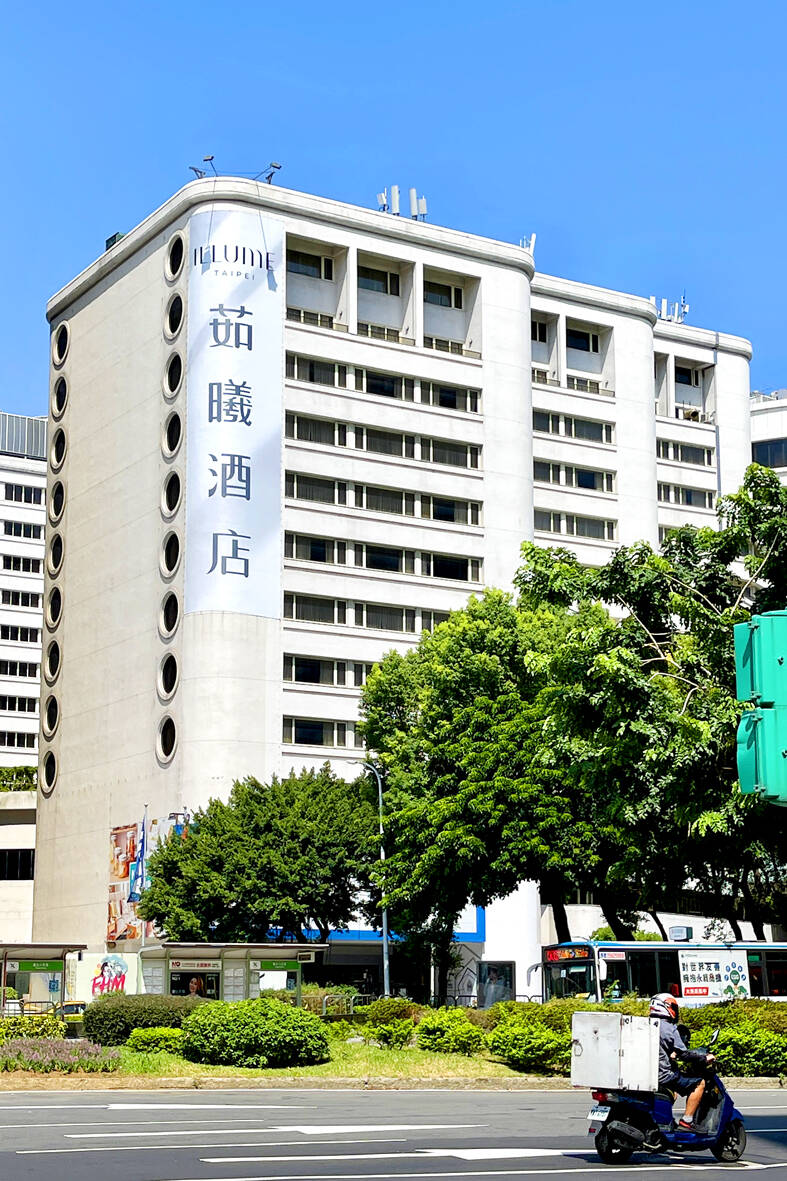Food and beverage sales at Illume Taipei (茹曦酒店) have been growing rapidly after FDC International Hotels Corp (雲品國際) in November last year took over operations of its buffet restaurant and banquet facilities.
The hotel in Taipei’s Songshan District (松山) said it expects a full recovery to pre-COVID-19 pandemic levels next year, when disease prevention measures are fully rolled back.
The hotel last year announced the collaboration with FDC after months-long renovation efforts and reducing the number of rooms from 730 to 312, saying the measures are part of efforts to boost space efficiency and save costs.

Photo: George Tsorng, Taipei Times
Food and beverage revenue grew threefold in the past five months, while occupancy rates returned to 60 percent, Illume Taipei marketing and communications director Tyler Wang (王品勳) said yesterday.
Room occupancy rates are 50 to 60 percent on average, up from 10 to 20 percent before the FDC deal, while average daily room rates increased from NT$2,000 to NT$4,500 (US$66 to US$147), he said.
Wang said the hotel has hosted guests from Japan, South Korea and Southeast Asia, but domestic travelers continue to account for about 70 percent, as global business travel is expected to resume slowly.
Meanwhile, FDC expects stable business growth this quarter after a rapid recovery from a COVID-19 slump in the second half of last year.
After strong showings during the Lunar New Year holiday, food and beverage sales continued to receive support from spring gatherings, the company said.
Revenue in the first two months of this year increased 28.17 percent year-on-year to NT$475.84 million, while the room occupancy rate rose above 80 percent at Palais de Chine Hotel (君品酒店) near Taipei Railway Station over the 228 Memorial Day holiday, the company said.
Its flagship Fleur de Chine Hotel (雲品溫泉酒店) near Sun Moon Lake (日月潭) in Nantou County is undergoing renovation, but is expected to lend support to FDC’s growth momentum after it reopens, it said.
FDC is seeking to benefit from an expected boom in domestic tourism spurred by the government’s distribution of NT$6,000 tax rebates to Taiwanese and some foreign residents.

UNCERTAINTY: Innolux activated a stringent supply chain management mechanism, as it did during the COVID-19 pandemic, to ensure optimal inventory levels for customers Flat-panel display makers AUO Corp (友達) and Innolux Corp (群創) yesterday said that about 12 to 20 percent of their display business is at risk of potential US tariffs and that they would relocate production or shipment destinations to mitigate the levies’ effects. US tariffs would have a direct impact of US$200 million on AUO’s revenue, company chairman Paul Peng (彭雙浪) told reporters on the sidelines of the Touch Taiwan trade show in Taipei yesterday. That would make up about 12 percent of the company’s overall revenue. To cope with the tariff uncertainty, AUO plans to allocate its production to manufacturing facilities in

Taiwan will prioritize the development of silicon photonics by taking advantage of its strength in the semiconductor industry to build another shield to protect the local economy, National Development Council (NDC) Minister Paul Liu (劉鏡清) said yesterday. Speaking at a meeting of the legislature’s Economics Committee, Liu said Taiwan already has the artificial intelligence (AI) industry as a shield, after the semiconductor industry, to safeguard the country, and is looking at new unique fields to build more economic shields. While Taiwan will further strengthen its existing shields, over the longer term, the country is determined to focus on such potential segments as

TAKING STOCK: A Taiwanese cookware firm in Vietnam urged customers to assess inventory or place orders early so shipments can reach the US while tariffs are paused Taiwanese businesses in Vietnam are exploring alternatives after the White House imposed a 46 percent import duty on Vietnamese goods, following US President Donald Trump’s announcement of “reciprocal” tariffs on the US’ trading partners. Lo Shih-liang (羅世良), chairman of Brico Industry Co (裕茂工業), a Taiwanese company that manufactures cast iron cookware and stove components in Vietnam, said that more than 40 percent of his business was tied to the US market, describing the constant US policy shifts as an emotional roller coaster. “I work during the day and stay up all night watching the news. I’ve been following US news until 3am

COLLABORATION: Given Taiwan’s key position in global supply chains, the US firm is discussing strategies with local partners and clients to deal with global uncertainties Advanced Micro Devices Inc (AMD) yesterday said it is meeting with local ecosystem partners, including Taiwan Semiconductor Manufacturing Co (TSMC, 台積電), to discuss strategies, including long-term manufacturing, to navigate uncertainties such as US tariffs, as Taiwan occupies an important position in global supply chains. AMD chief executive officer Lisa Su (蘇姿丰) told reporters that Taiwan is an important part of the chip designer’s ecosystem and she is discussing with partners and customers in Taiwan to forge strong collaborations on different areas during this critical period. AMD has just become the first artificial-intelligence (AI) server chip customer of TSMC to utilize its advanced